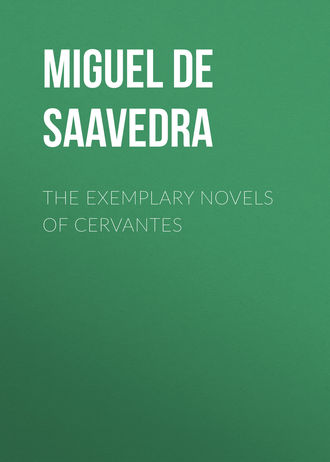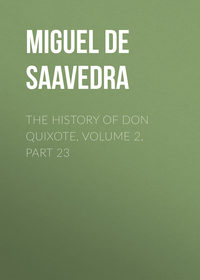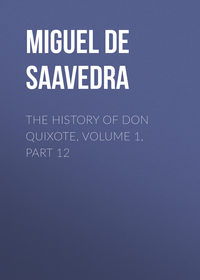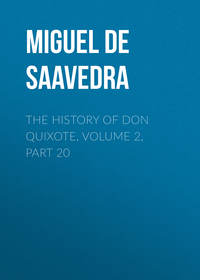 полная версия
полная версияThe Exemplary Novels of Cervantes
Richard was astounded at this unexpected arrival, and fearing that it would have a fatal effect upon Isabella, he went to her bedside, and said to her, in presence of her parents, "Beloved of my soul, my parents, in their great love for me, but ill conceiving how great is mine for you, have brought hither a Scotch lady, to whom they arranged to marry me before I knew your worth. They have done so, I believe, upon the supposition that her great beauty will efface from my soul the image of yours, which is deeply impressed upon it. But from the moment I first loved you, Isabella, it was with a different love from that which finds its end attained in the gratification of the sensual appetite: for though your great beauty captivated my senses, your infinite virtues enthralled my soul, so that if I loved you in your beauty, I adore you in your plainness. That I may confirm that truth, put your hand in mine."
She held out her right hand; he took it in his, and continued:
"By the Catholic faith which my Christian parents have taught me; or, if that is not as pure and perfect as it ought, then, by that held by the Roman pontiff, and which in my heart I confess, believe, and hold, do I swear, and by the true God who hears us, I promise you, Isabella, soul of my soul! to be your husband; and your husband I am from this moment, if you will raise me up so high."
Isabella could only kiss Richard's hand again and again, and tell him in a voice broken by her tears, that she accepted him as hers, and gave herself to him as his slave. Richard kissed her disfigured face, which he had never ventured to kiss in its beauty; and her parents, with tears of affection, ratified their solemn betrothal. Richard told them that he would find a way to postpone his marriage with the Scotch lady, and that when his father proposed to send them to Spain they were not to refuse, but were to go to Cadiz and wait for him there or in Seville for two years, within which time he gave them his word he would be with them, if God spared his life. Should he not appear within that time, they might be assured that he was prevented by some insuperable impediment, and most probably by death. Isabella replied that she would wait for him not only two years, but all the years of her life, until she knew that he was no longer alive; for the moment that brought her that news would be her last.
Richard having at length quitted Isabella, went and told his parents that on no account would he marry the Scotch lady until he had first been to Rome for the satisfaction of his conscience; and he represented the matter in such a light to them and to the relations of Clesterna (that was the name of the Scotch lady), that as they were all Catholics, they easily assented, and Clesterna was content to remain in her father-in-law's house until the return of Richard, who proposed to be away a year. This being settled, Clotald told his son of his intention to send Isabella and her parents to Spain, if the queen gave them leave; perhaps her native air would confirm and expedite her incipient recovery. Richard, to avoid betraying his secret intentions, desired his father, with seeming indifference, to do as he thought best; only he begged him not to take away from Isabella any of the presents which the queen had given her. Clotald promised this, and the same day he went and asked the queen's leave both to marry his son to Clesterna, and to send Isabella and her parents to Spain. The queen granted both requests, and without having recourse to lawyers or judges, she forthwith passed sentence on the lady keeper, condemning her to lose her office, and to pay down ten thousand crowns for Isabella. As for Count Ernest, she banished him from England for six years.
Four days afterwards Richard set out on his exile, and the money had been already paid. The queen, sending for a rich merchant, resident in London, who was a Frenchman, and had correspondents in France, Italy, and Spain, put the ten thousand crowns into his hands, and desired him to let Isabella's father have bills for the amount on Seville or some other place in Spain. The merchant having deducted his profit, told the queen he would give good and safe bills on another French merchant, his correspondent in Seville, in the following manner: – He would write to Paris that the bills might be drawn there by another correspondent of his, in order that they should be dated from France and not from England, because of the interdicted communication between that country and Spain. It would only be necessary to have a letter of advice from him, with his signature and without date, in sight of which the merchant of Seville would immediately pay the money, according to previous advice from the merchant of Paris.
In fine, the queen took such securities from the merchant as made the payment certain; and not content with this, she sent for the master of a Flemish vessel who was about to sail for France, only to obtain a manifest from some French port, in order to be allowed to land in Spain; and she begged him to take Isabella and her parents, treat them well, and land them safely at the first Spanish port he reached. The master, who desired to please the queen, said he would do so, and would land them at Lisbon, Cadiz, or Seville. After this the queen sent word to Clotald not to take from Isabella any of the presents she had given her, whether jewels or clothes.
The next day Isabella and her parents came to take leave of the queen, who received them with great affection. The queen gave them the merchant's bills, besides many other presents, both in money and in things suitable for their voyage. Isabella expressed her gratitude in such terms as to increase the queen's gracious disposition towards her. She took leave of the ladies of the court, who, now that she had become plain, would rather have had her remain among them, having no longer reason to envy her beauty, and being willing to enjoy her society for the sake of her good qualities of mind and disposition. The queen embraced the three, and took leave of them, commending them to good fortune and to the master of the vessel, and asking Isabella to inform her of her arrival in Spain, and of her health at all times through the French merchant. That evening they embarked, not without tears on the part of Clotald, his wife, and his whole household, by whom Isabella was exceedingly beloved. Richard was not present at the departure, for, in order to avoid betraying his feelings, he had gone with some of his friends to the chase.
Many were the dainties which the lady Catherine gave. Isabella for use on the voyage; endless were her embraces, her tears, and her injunctions that she should write to her; for all which Isabella and her parents returned suitable thanks. That night the vessel set sail, and having reached France with a fair wind, and obtained the necessary papers to enable them to enter Spain, they crossed the bar of Cadiz thirty days afterwards, and there Isabella and her parents disembarked. Being known to the whole city, they were joyfully welcomed, and warmly congratulated on their recovery of Isabella, and on their liberation, from their Turkish captors (for that fact had been made known by the captives whom Richard generously released), and also from detention in England. By this time Isabella began to give great hopes that she would quite recover her original beauty.
For more than a month they remained in Cadiz, recruiting themselves after the toils of their voyage; and then they went to Seville, to see if they should obtain payment of the ten thousand crowns upon the French merchant's bill. Two days after their arrival they called upon the person on whom it was drawn. He acknowledged it, but said that, until the arrival of advices from Paris, he could not pay the money. Isabella's father hired a large house facing St. Paul's, because there was in that holy convent a nun who was remarkable for rare musical talents, and who was his own niece. They chose the house to be near her for that reason, and because Isabella had told Richard that if he came to look for her he would find her in Seville, and her cousin, the nun of St. Paula's, would tell him where: he had only to ask for the nun who had the best voice in the convent; every one would know her by that description.
It was forty days more before the advices came from Paris, and two days after their arrival the French merchant paid Isabella the ten thousand crowns, which she handed over to her parents. With that sum, and something more made by the sale of part of Isabella's numerous jewels, her father again began business as a merchant, to the surprise of those who were cognisant of his great losses. After a few months his lost credit began to return; so, too, did his daughter's good looks, so that, whenever female beauty was the subject of discourse, the palm was universally conceded to the Spanish-English lady; for by that name, as well as for her great beauty, she was known throughout the city. Through the French merchant of Seville, Isabella and her parents wrote to the queen of England, announcing their arrival in such grateful and dutiful terms as the many favours received at her Majesty's hands required. They also wrote to Clotald and Catherine, whom Isabella addressed as her revered parents.
Their letters to the queen remained unanswered, but from Clotald and his wife they received a reply, congratulating them on their safe arrival, and informing them that their son Richard had set out from France the day after their departure, and thence to other countries, which it behoved him to visit for the tranquillity of his conscience. Isabella immediately concluded that Richard had left England for no other purpose than to seek her; and cheered by this hope, she was as happy as she could be, and strove to live in such a manner that, when Richard arrived in Seville, the fame of her virtues should reach his ears before he learned where she lived.
She seldom or never quitted the house, except to go to the convent, and attended no other church services than those performed there. She never went near the river, or to Triana, or witnessed the general rejoicings at the Campo de Tablada, or the Puerta de Xeres on Sari Sebastian's day, celebrated by an almost innumerable multitude; in short, she never went abroad for any kind of amusement in Seville; her whole time was spent in her devotions, and in praying and hoping for Richard's arrival. The consequence of this strict retirement was a great increase of the general interest about her; thence came serenades in her street by night, and promenades by day. The desire which so many felt to see her, and the difficulty of accomplishing it, was a great source of gain to the professional go-betweens, who severally professed that they alone had the ear of Isabella, and some there were who had recourse to what are called charms, which are nothing but deceits and follies; but in spite of all this, Isabella was like a rock in the ocean, which the winds and waves assail in vain. A year and a half had now passed, and her heart began to yearn more and more as the end of the period assigned by Richard drew near. Already, in imagination, she looked upon him as arrived; he stood before her eyes; she asked him what had caused his long delay; she heard his excuses; she forgave him, embraced and welcomed him as the half of her soul; and then there was put into her hands a letter from the lady Catherine, dated from London fifty days before. It was as follows: —
"Daughter of my heart, – You doubtless recollect Richard's page, Guillart. He accompanied Richard on his journey the day after you sailed, to France and other parts, whereof I informed you in a former letter. This said Guillart, after we had been sixteen months without hearing news of my son, yesterday entered our house with news that Count Ernest had basely murdered Richard in France. Imagine, my daughter, the effect upon his father, myself, and his intended wife, of such news as this, coming to us in such wise as left no doubt of our misfortune. What Clotald and myself beg of you once more, daughter of my soul, is that you will pray heartily to God for the soul of Richard, for well he deserves this service at your hands, he who loved you so much as you know. Pray also to our Lord to grant us patience, and that we may make a good end; as we will pray for long life for you and your parents."
This letter and the signature left no doubt in Isabella's mind of the death of her husband. She knew the page Guillart very well, and knew that he was a person of veracity, and that he could have had no motive for publishing false news in such a matter; still less could the lady Catharine have had any interest in deceiving her so painfully. In fine, in whatever way she considered the subject, the conclusion at which she invariably arrived was, that this dismal intelligence was unquestionably true. When she had finished reading the letter, without shedding tears or showing any outward tokens of grief, with a composed face and apparently tranquil breast, she rose from her seat, entered an oratory, and kneeling before a crucifix, made a vow to become a nun, thinking herself free to do so, as she was no longer a betrothed maiden, but a widow. Her parents studiously concealed the grief which this affecting news caused them, in order that they might the better console their bereaved daughter; whilst she, as if mistress over her sorrow, having subdued it by the holy Christian resolution she had made, became their comforter. She made her intention known to them, and they advised her to postpone its execution, until the two years were elapsed which Richard had assigned as the duration of his absence. That delay would suffice for confirming the news of his death, and then she might with more security change her condition. Isabella followed their advice; and the six months and a half which remained to complete the term of two years were spent by her in devotional exercises, and in arranging for her entrance into the convent of Santa Paula, in which her cousin was a nun.
The remainder of the two years elapsed, and the day arrived when she was to take the veil. The news having spread through the city, the convent, and the space between it and Isabella's abode, was thronged by those who knew her by sight, or by report only; and her father having invited her friends, and these having invited others, Isabella had for her escort one of the most imposing retinues ever seen in Seville on such occasions. It included the chief justice of Seville, the vicar-general, and all the titled personages of both sexes in the city, so great was the desire of all to behold the sun of Isabella's beauty, which had been for so many months eclipsed. And as it is customary for maidens about to take the veil to dress themselves in their very gayest attire on the day when they are to renounce for ever the pomps and vanities of the world, Isabella wore the same splendid dress in which she was presented to the queen of England, with her necklace and girdle of lustrous pearls, her diamond ring, and all her other sumptuous jewels. Thus gorgeously attired, Isabella set out from home on foot, for the short distance to the convent seemed to render carriages superfluous; but the concourse was so great that the procession could hardly advance, and its members regretted too late that they had not chosen to ride instead of walking. Some of the spectators blessed the father and mother of that lovely creature; others praised Heaven that had endowed her with so much beauty. Some strained forward to see her; others, having seen her once, ran forward to have a second view of her. Among those who were most eager to behold her, was a man who attracted the notice of many by his extraordinary efforts. He was dressed in the garb of a slave lately ransomed, and wore on his breast the emblem of the Holy Trinity, by which it was known that he had been redeemed by the charity of the Redemptorist fathers.
Already Isabella had set one foot on the threshold of the convent gate, where the prioress and the nuns stood ready to receive her with the cross, when this ransomed captive cried out, "Stop, Isabella, stop!" Isabella and her parents turned at this cry, and saw the man cleaving his way towards them through the crowd by main strength. The blue hat he wore having fallen oft through the violence of his exertions, disclosed a profusion of flaxen hair, and a clear red and white complexion, which showed him at once to be a foreigner.
Struggling, stumbling, and rising again, he at last reached the spot where Isabella stood, caught her hand in his, and said, "Do you know me, Isabella? I am Richard, your betrothed." "Well do I know you," said Isabella, "if indeed you are not a phantom come to trouble my repose." Her parents also examined his features attentively, and saw that this captive was indeed Richard. As for him, weeping at Isabella's feet, he implored her not to let the strange garb he wore prevent her recognising him, nor his low fortune impede the fulfilment of the pledges exchanged between them. In spite of the impression which the letter from Richard's mother had made on her memory, Isabella chose rather to believe the living evidence before her eyes; and embracing the captive, she said, "Without doubt, my lord and master, you are he who alone could hinder the fulfilment of my Christian determination; you are without doubt the half of my soul; my own betrothed! your image is stamped upon my memory, and treasured in my heart. The news of your death, sent me by your lady mother, not having killed me on the spot, I resolved to dedicate myself to religion, and I was just about to enter this convent for the rest of my days; but since God has shown us by so just an impediment that he wills otherwise, it is not for me to refuse obedience. Come, señor, to the house of my parents, which is yours, and there I will give myself to you in the way which our holy catholic faith prescribes."
This dialogue, overheard by the spectators, struck them all with amazement. The chief justice and the vicar-general immediately demanded what was all this ado, who was this stranger, and what marriage was this they talked about. Isabella's father replied, that what they had seen was the sequel of a story which required a different place for the telling of it; therefore, he begged that all who desired to hear it should turn back to his house, which was close by, and there he would fully satisfy their curiosity, and fill them with wonder at the strange things he should relate.
Just then one of the crowd cried out, "Señors, this young man is the great English corsair. It is not much more than two years since he took from the Algerine corsairs the great Portuguese galleon from the Indies. There is not the least doubt that he is the very man; I know him, because he set me at liberty, and gave me money to carry me to Spain, and not me only, but three hundred other captives likewise." These words increased the general excitement and the desire to see all these intricate matters cleared up. Finally, the principal persons of the city, with the chief justice and the vicar-general, went back with Isabella to her father's house, leaving the nuns sorely discomfited, and crying with vexation at the loss they had sustained in not having the beautiful Isabella to grace their nunnery. The company being arrived at the house of Isabella's father, she made them be seated in a long hall, and though Richard would willingly have taken it upon himself to tell his story, yet he thought it better to trust it to Isabella's tongue than to his own, which was not very expert in speaking Spanish. Accordingly she began her narration in the midst of profound silence and attention.
She related all that happened to her from the day when Clotald carried her off from Cadiz until her return thither; also Richard's engagement with the Turks; his liberality to the Christians; the promise they had given each other to be husband and wife; the two years' delay agreed on, and the news she had received of his death, which seemed to her so certain, as to have nearly occasioned her taking the veil! She extolled the liberality of the queen of England, the Christian faith of Richard and his parents, and she concluded by saying, that Richard would relate what had happened to him since he left London until that moment, when he stood before them in the dress of a captive, and with the mark of having been ransomed by charity. "I will do so," said Richard, "and briefly relate the hardships I have undergone.
"I quitted London to avoid marrying Clisterna, the Scottish Catholic lady, to whom Isabella has told you that my parents wished to unite me, and I took with me Guillart, my page, the same who carried the news of my death to London, as my mother stated in her letter. Passing through France, I arrived in Rome, where my soul was gladdened, and my faith fortified. I kissed the feet of the supreme pontiff, confessed my sins to the grand penitentiary, obtained absolution, and received the necessary certificates of my confession and penance, and of the submission I had paid to our holy mother, the church. This done, I visited the numberless holy places in that sacred city, and out of two thousand crowns I had with me in gold, I deposited one thousand six hundred with a money-changer, who gave me a letter of credit for them on one Roqui, a Florentine, in this city. With the four hundred that remained, I set out for Spain, by way of Genoa, where I had heard that there were two galleys of that signory bound for this country. I arrived with Guillart at a place called Aquapendente, which is the last town in the pope's dominions on the road to Florence, and in an inn at which I alighted, I met Count Ernest, my mortal enemy. He had four servants with him, he was disguised, and was going, as I understood, to Rome, not because he was a Catholic, but from motives of curiosity. I thought he had not recognised me, and shut myself up in a room with my servant Guillart, where I remained on my guard, intending to shift my quarters at nightfall. I did not do so, however, for the perfect indifference shown by the count and his servants made me confident that they had not recognised me. I supped in my room, locked the door, looked to my sword, commended myself to God, but would not lie down.
"My servant lay asleep, and I sat on a chair between asleep and awake; but a little after midnight, I was near put to sleep for eternity by four pistol shots fired at me, as I afterwards learned, by the count and his servants. They left me for dead, and their horses being in readiness, they rode off, telling the innkeeper to bury me suitably, for I was a man of quality. My servant, awaking in terror at the noise, leaped out of a window, and ran away in such mortal fear, that it seems he never stopped till he got to London, for it was he brought the news of my death.
"The people of the inn came up and found I had been struck by four balls and several slugs, but none of the wounds in any vital part. Calling for a confessor, I received all the sacraments as became a Catholic Christian; but I gradually recovered, though it was two months before I was able to continue my journey. I then proceeded to Genoa, but found no other means of passage than two feluccas, which were hired by myself and two Spanish gentlemen. One of them we employed to go before and pilot the way, and in the other we ourselves embarked. In this way we pursued our voyage, closely hugging the shore; but when we came to a spot on the coast of France, called the Three Marias, two Turkish galleys suddenly came out upon us from a creek, and one keeping to seaward of us, the other more in shore, they cut off our escape to the land and captured us. The corsairs stripped us to the skin, plundered the feluccas, and having completely emptied them, let them drift ashore, instead of sinking them, saying that they might serve to bring them more pickings another time.
"You may well believe how bitterly I felt my captivity, and above all, the loss of the certificates from Rome, which I carried in a tin case, with the bill for the sixteen hundred ducats; but, by good fortune, they fell into the hands of a Christian slave, a Spaniard, who kept them, for if the Turks had got hold of them, they would have required for my ransom at least the amount of the bill. They carried us to Algiers, where I found that the fathers of the Most Holy Trinity were redeeming Christian slaves. I spoke to them, told them who I was, and they, moved by charity, ransomed me, though I was a foreigner. The price set upon me was three hundred ducats; they paid down one hundred on the spot, and engaged to pay the remaining two hundred as soon as the ship should return with the contributions for the release of the Redemptorist father who remained in Algiers in pledge for four thousand ducats, which he had spent over and above the amount he had brought in hand; for so extreme is the charity of these compassionate fathers, that they give their liberty for another's, and remain in captivity that others may go free. In addition to the happiness of obtaining my liberty, I recovered the case with the certificates and the bill. I showed its contents to the good father, and promised him five hundred ducats, in addition to the amount of my ransom, as a contribution towards the payment of the sum for which he was a hostage.









